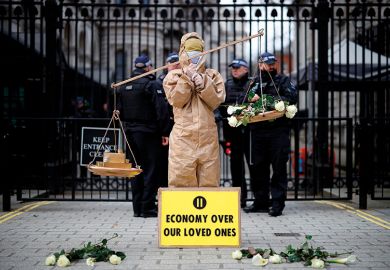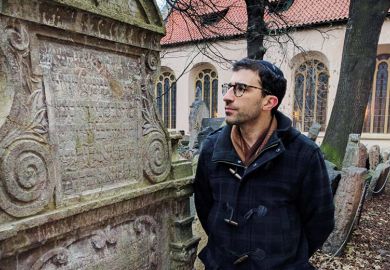Pandemic research by humanities scholars will play a pivotal role in understanding the coronavirus’ social impact and how society can bounce back from it, the head of a UK research council has insisted.
With the public and governments focused on the extraordinary efforts of medical researchers that have led to vaccines and treatments for Covid-19, some scholars have worried that the pandemic will put research by philosophers, historians, literary scholars, artists and other humanities experts at a disadvantage as funders focus on disciplines with more immediate relevance to the health crisis.
Some have criticised the “academic opportunism” of humanities scholars who scrambled to pivot their research towards the pandemic, claiming that some links to the unfolding crisis were tenuous.
But Christopher Smith, executive chair of the Arts and Humanities Research Council (AHRC), said scholars should not be afraid to embrace the pandemic agenda in their research.
“This pandemic chimes with many things that we were already grappling with in the contemporary world, so it would be strange if we turned away from it,” he told Times Higher Education in his first interview since starting his four-year term of office in September.
Research from all types of scholars will be needed to analyse the responses of different countries and societies to the pandemic, the unfolding consequences of the crisis and how we might now act, said Professor Smith, who was previously professor of ancient history at the University of St Andrews and led the British School at Rome from 2009 to 2017.
“It’s worth asking what the book on Covid will look like when it is written,” said Professor Smith, who said the story of vaccine creation “might not cover many pages”.
“We might actually see a lot on issues of global consumption and interconnectedness, why we were travelling so much and coverage of the history of infection and hospitals – all of these will depend a huge amount on research that has not yet been done,” he said.
That research is already under way thanks to the rapid approval of more than 400 pandemic-related projects by UK Research and Innovation – which oversees the UK’s nine research councils, including the AHRC – with studies funded to assess how poetry, comics, community arts projects and the creative industries have been affected by the public health emergency.
With an estimated 170,000 jobs already lost in the live music sector alone, other creative industries badly hit and the social, political and economic fallout from the crisis still far from settled, these studies and others related to the pandemic will be vitally important, said Professor Smith, who admitted that balancing this work at the council with its commitment to basic research “will be a challenge, as it will for all research councils”.
“When I think about what the AHRC stands for, at its basis, it is fundamental research combined with a commitment to intellectual rigour; it is the study of everything humans have done, or expressed through painting, literature, dance and other mediums, and how we imagine ourselves in the future,” he said.
With the pandemic still looming large, there was no contradiction with basic research for arts and humanities scholars who chose to look at its roots or effects, Professor Smith said. “We shouldn’t be entirely driven by it, but there are occasions when one should look sharply at a problem.”
Register to continue
Why register?
- Registration is free and only takes a moment
- Once registered, you can read 3 articles a month
- Sign up for our newsletter
Subscribe
Or subscribe for unlimited access to:
- Unlimited access to news, views, insights & reviews
- Digital editions
- Digital access to THE’s university and college rankings analysis
Already registered or a current subscriber?








